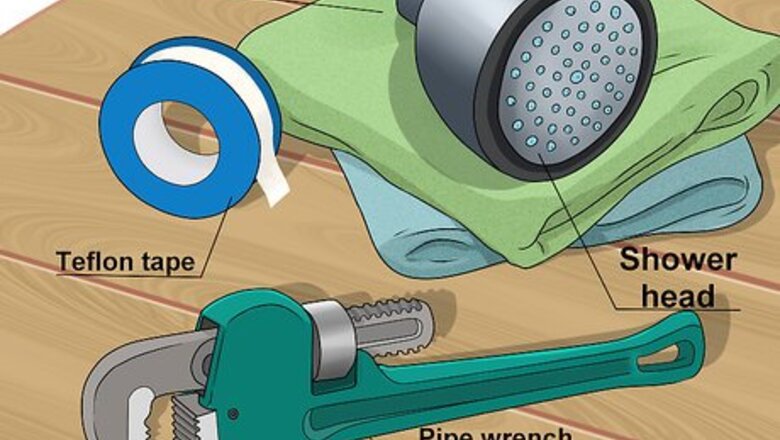
views
Doing the Prep Work
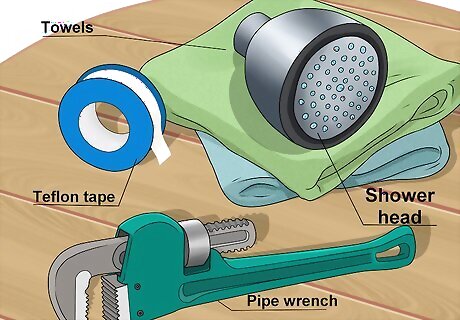
Gather your supplies. The shower arm that comes out of the wall and connects to the shower head can be replaced if necessary. Most shower heads are sold separately from arms, though both can be found at a hardware store, along with the following needed tools and supplies: Pipe wrench Thread seal tape (Teflon tape) Towels (at least 2)
Make sure the faucet is off. Though it may seem obvious, make sure the faucet for the shower is completely turned off. There’s no need to shut off the water valve itself—there won’t be water going to the shower head as long as the faucet is off.
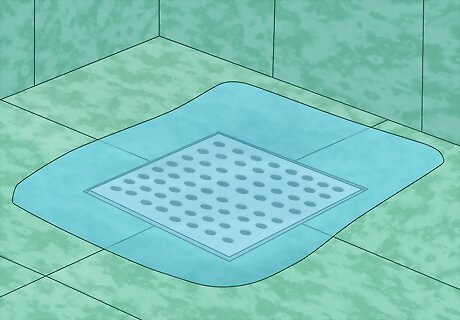
Prepare your work area. Close the drain to your shower. This will prevent dropped fasteners and other small pieces of hardware from being lost down the drain. Lay down a towel over closed drain so that anything that falls doesn’t bounce off the floor or tub, but instead is cushioned by the towel.
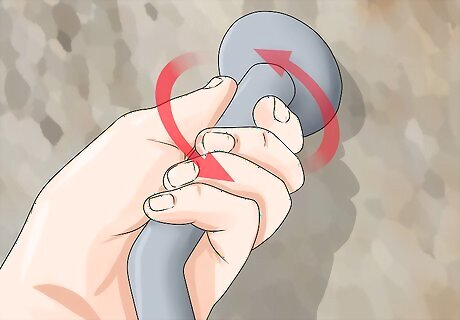
Remove the shower arm, if desired. Removing the shower arm is not necessary for installing a wall-mounted shower head. However, in some situations the original shower arm might not suit changes in bathroom décor, or it might simply be time for an upgrade. To remove the shower arm: Use your bare hands to loosen the shower arm by turning it counterclockwise. If it’s corroded, spray WD-40 onto the threaded connection and let it sit for a few minutes before loosening it. Apply an adjustable wrench or pipe wrench to the shower arm if it refuses to turn by hand. Use moderate, steady, counterclockwise force until the arm comes free. Insert the replacement shower arm by turning it clockwise into the fitting. If you replace the shower arm, you should also replace the trim ring (also known as an escutcheon). Though it’s held in place with caulk, you should be able to slip it off.
Putting in a Shower Head
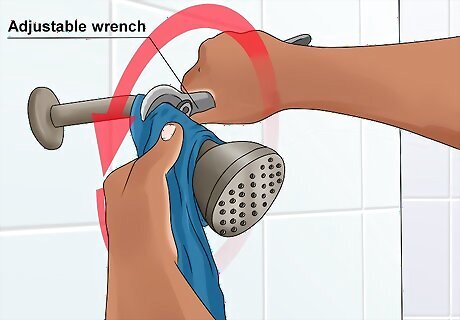
Remove the shower head. If you plan on keeping your current shower arm, wrap a dry, clean towel around the base of the arm where it meets the wall. Grip the arm at this point with your wrench so the towel protects the arm from damage. Hold the arm in place with the wrench and unscrew the head counterclockwise by hand. For stubborn shower heads, wrap the head in a clean cloth to protect the metal’s finish. Grip and turn the head with a suitable wrench, pair of channel locks, or pair of pliers with firm, steady pressure until the head comes loose.
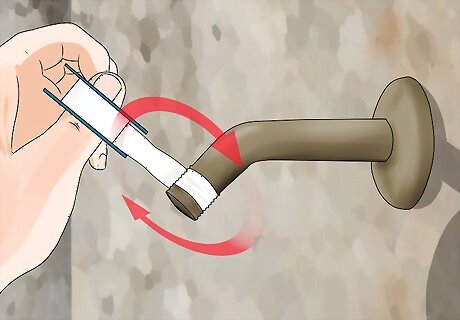
Wrap the threading on the shower arm in Teflon tape or apply thread joint compound. Clean the threading of the shower arm with a suitable general purpose cleaner and a fresh towel. Remove any Teflon tape or joint compound from the previous installation. Wipe the fixture dry with the towel. Then, wrap the threads of the shower arm in Teflon tape or apply thread joint compound. Teflon tape should be applied to threading in a clockwise direction. Wind the tape two to three times around the bottommost threads of the shower arm. In some cases, the Teflon tape might not sink into the threading. Use your fingernail to push the tape into the threading. Some varieties of shower head may not require Teflon tape. Always follow the installation notes that came with the shower head for best results.
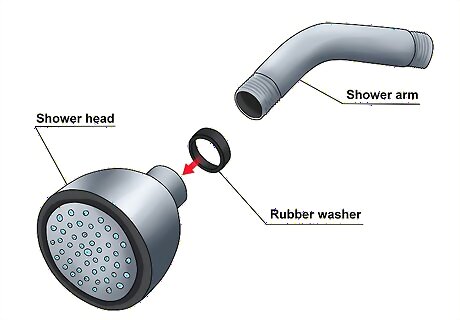
Assemble the shower head, if necessary. Some shower heads may come with multiple pieces, extensions, or other features. Most commonly, a rubber washer will accompany your washer head. This inserts into the shower arm connector for the head. A diagram of how to insert the rubber washer into the shower head can usually be found on the packaging of the shower head or in the instructions that came with it.
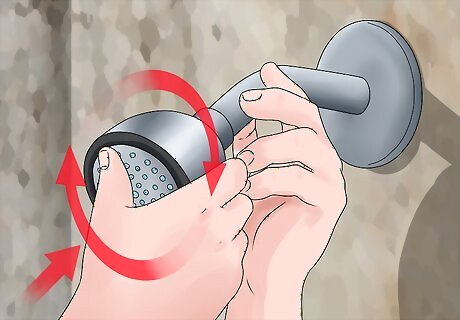
Fasten the shower head to the arm. Replace the trim ring (or escutcheon), then screw the shower head clockwise onto the taped threading at the arm’s end. Do so slowly to prevent the threads from crossing or binding, which can damage the Teflon tape. When hand-tight, wrap a piece of cloth around the connection to protect the metal’s finish from being scratched. With a suitable wrench or pliers, tighten the connector a quarter turn more. Avoid over-tightening your shower head. This can damage the threading or the connection nut, which can cause leaks.
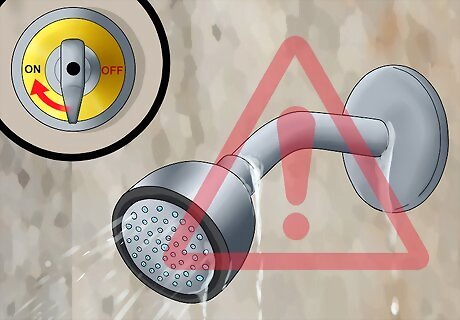
Check for leaks. Release the shutoff valve to resupply your shower with water. Check your shower for leaks. Turn the shower on and off. Adjust the shower head. Turn off the water supply if water leaks from the connection between the shower arm and head. Place a towel over the connector between the shower arm and head and apply firm, steady pressure with a wrench to tighten it until leaks cease. If leaks do not appear to be lessening as you tighten the connection, you may need to unscrew the head, remove and reapply the Teflon tape, and repeat the described installation process up to this point.
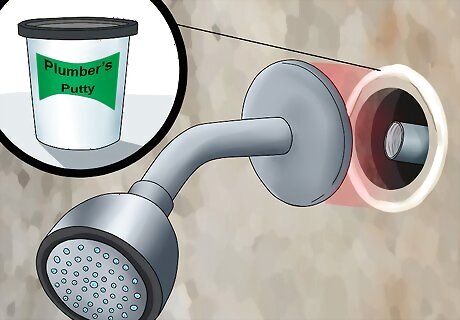
Add finishing touches and enjoy your new shower head. If you’ve installed a new shower arm, you may need to use plumber’s putty to seal the space between the arm and the wall. This protects the wall from moisture damage. Apply the putty according to its label instructions. Enjoy your new shower head.
Selecting a Shower Head

Find a wide selection through online sellers. An online keyword search for “shower heads” will yield results from major home centers, like Home Depot, to online only marketplaces, like Amazon. These online selections are often sizable, but some items may appear more desirable than they actually are. Call around to local hardware stores, home centers, and plumbing supply companies to check if you can see the shower head in person, where you’ll have a better opportunity to evaluate its quality.
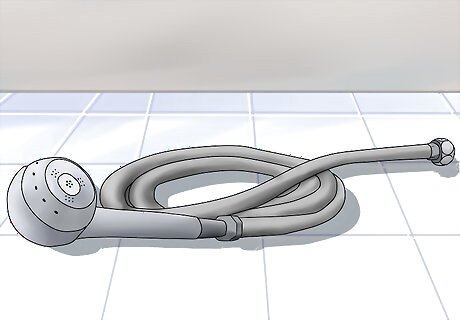
Prioritize metal shower heads. As a general rule, metal shower heads tend to be better than plastic ones. Chrome finish and brass in the construction are good indications of quality. Metal hoses, for shower heads with hose attachments, stay flexible instead of becoming stiff like most kinds of plastic hose. Chrome and brass do not rust, which makes these materials ideal for your shower head. These fixtures may be slightly more expensive, but will likely last longer and operate better.
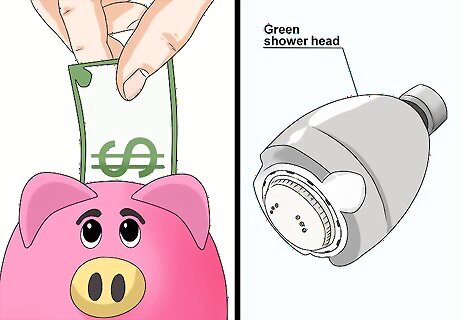
Save money with a green shower head. Some shower heads, like low-flow models, are designed to be water and energy efficient. These can save you money on water and electric bills. Green shower heads generally install similarly to normal models.
Opt for a shower head with a filter if desired. If you have hard water or are concerned about chemicals in the water, you can purchase a shower head with a filter. This ensures that the water coming out of the shower head is clean and pure.




















Comments
0 comment